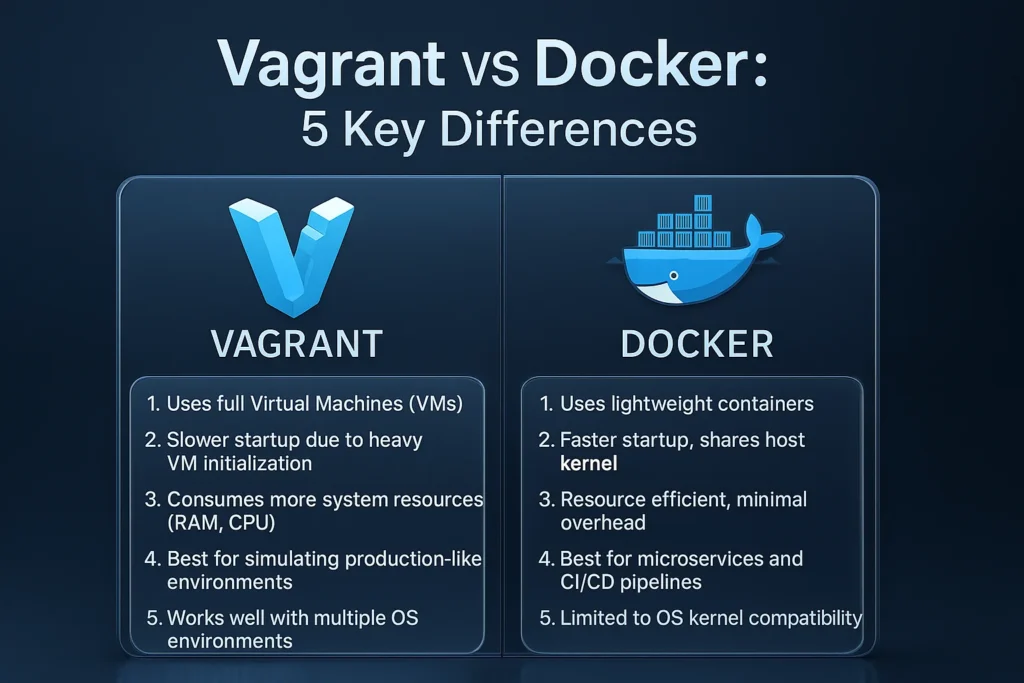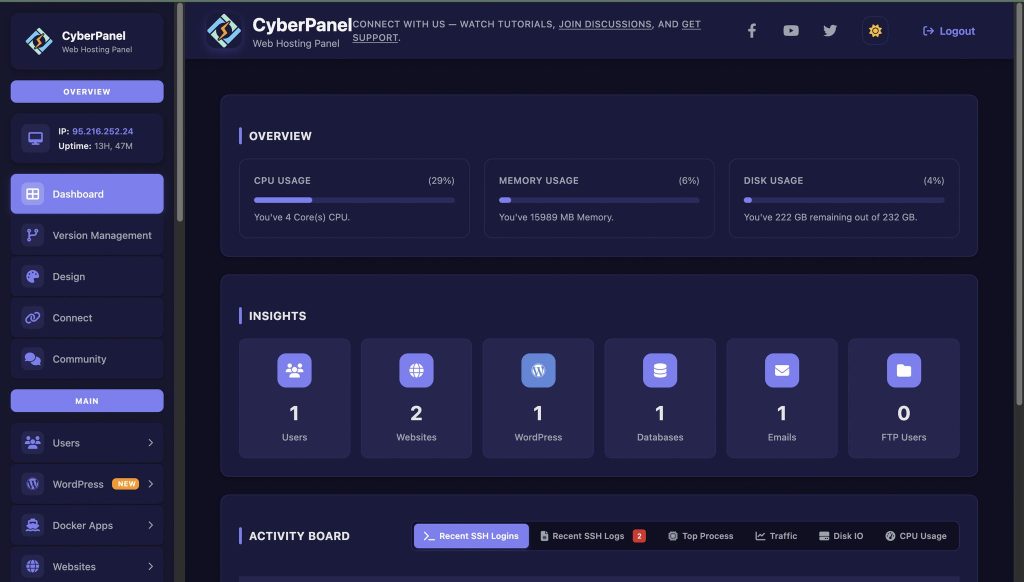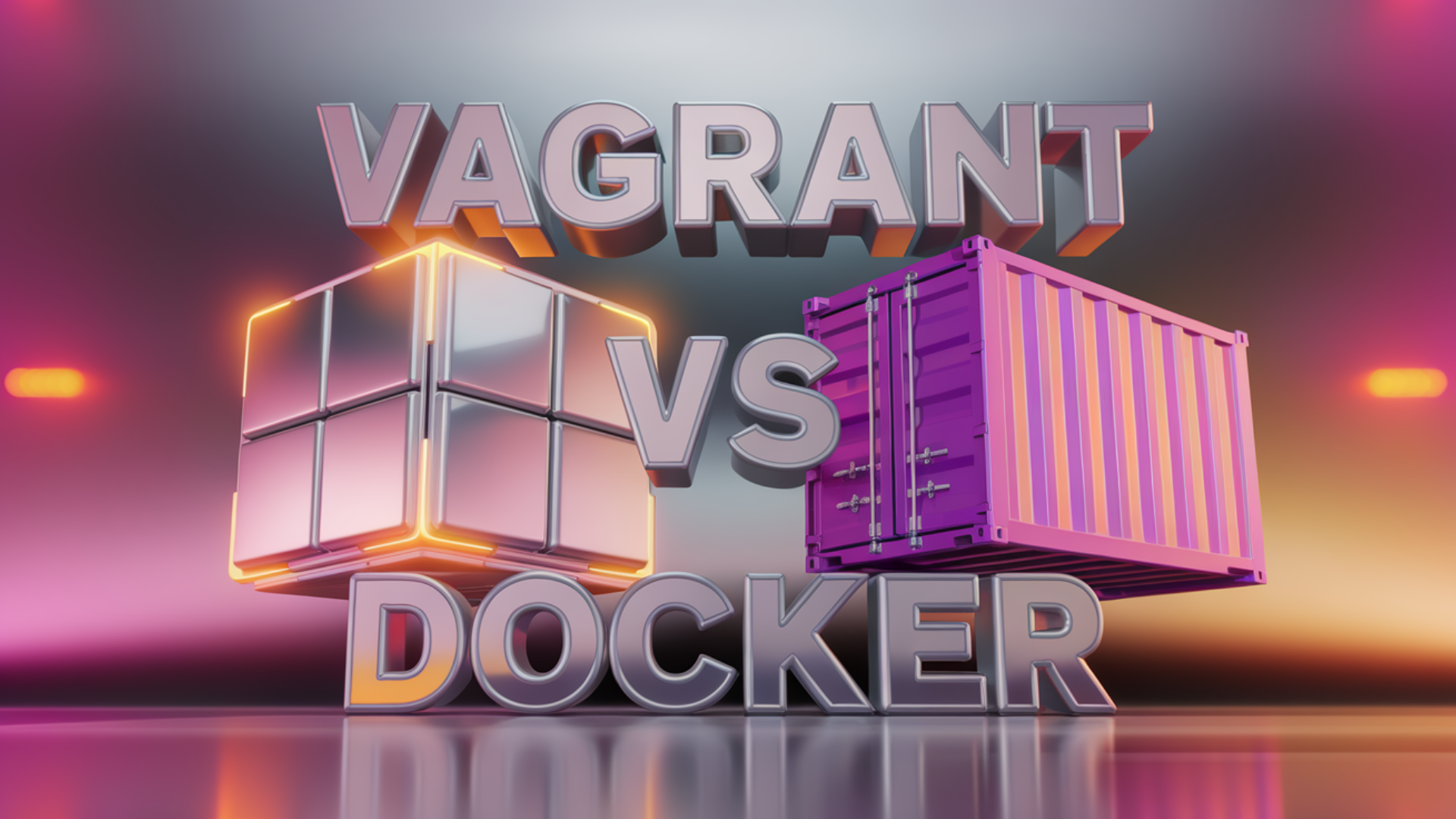It can be challenging for developers to choose between Vagrant vs Docker when wanting a dependable and speedy local environment. Both are popular tools for local development, but they have different purposes. Vagrant is used to create complete virtual machine environments, while Docker allows the use of lightweight containers that use the host system. Understanding the difference between Docker vs Vagrant is important if you want to build, test, or deploy software.
This article compares Docker vs Vagrant in the context of local development, explains where Vagrant vs Docker Compose fits into the conversation, and mentions the differences between Docker Machine vs Vagrant for provisioning local development environments for Linux containers and virtual machines. By the end of this article, you will know exactly which tool is appropriate for your project.
What is Vagrant?
It is an open-source tool for building and managing virtualized development environments. It uses providers to create full operating system environments that you can use for testing and development. Providers include VirtualBox or VMware.
What is Docker?
It is a containerization tool that allows you to package applications with their dependencies into lightweight, portable containers. Containers share the host system kernel to make them faster and more resource-efficient than virtual machines.

Docker vs Vagrant for Local Development
Docker is lightweight and fast, making it great for rapid application testing and deployment. Vagrant performs development using full VMs, which allows for tighter production parity, but at a higher resource cost. When speed of deployment and resource efficiency are important, Docker is the clear choice; but Vagrant is great for local development, particularly if there are complex dependencies.
How do Vagrant and Docker Differ?
Vagrant vs Docker mainly differ in the manner they approach handling environments.
Get exclusive access to all things tech-savvy, and be the first to receive
the latest updates directly in your inbox.
- Vagrant sets up virtual machines that have their own OS.
- Docker sets up containers using the components of the host operating system, sharing the host OS kernel with the container.
Because of this, Docker is lighter and faster than Vagrant (in terms of speed), while Vagrant has isolation at the system level in comparison to Docker.
Docker Machine vs Vagrant
Docker Machine and Vagrant are two tools that enable the creation of virtual machines, but the process of creating these virtual machines differs. Docker Machine is a tool that allows you to install Docker Engine on virtual hosts, while Vagrant provisions virtual machines that have an entire operating system on them. Docker Machine is light and simple, while Vagrant provides more control at the OS level, but it is heavy.
Comparison Table: Vagrant vs Docker
| Feature | Vagrant | Docker |
|---|---|---|
| Type | Virtual Machines | Containers |
| Speed | Slower, resource-heavy | Fast, lightweight |
| Use Case | Full OS replication | App deployment, microservices |
| Learning Curve | Steeper | Easier |
| Local Development | Good but heavy | Excellent and efficient |
Code Illustration: Running a Simple Container with Docker
# Run an Nginx container
docker run -d -p 8080:80 nginx
This command starts an Nginx web server from a Docker container and binds it to port 8080 on your host. To replicate this with Vagrant would require provisioning a VM, installing nginx, and possibly configuring your networking components, which is much slower.
The Role of CyberPanel in Your Docker and Vagrant Workflows

CyberPanel, a free web hosting control panel, can be run directly inside a Docker container to provide fast and lightweight hosting. This alleviates the overhead of dealing with complete Vagrant virtual machines. If you’re developing with a Docker-based application set up, CyberPanel is a fast solution for managing websites, databases, and servers efficiently.
Conclusion: Which To Go With?
When it comes to fast, modern, and lightweight development, Docker is the obvious choice. It has a smaller learning curve, saves resources, and is easier to scale. That said, Vagrant is still very useful in situations where you need a complete operating system to be replicated. The consensus among most developers today is that Docker is preferable for all local development and production.
Still getting confused? Choose Docker for agility, Vagrant for full OS testing!
People Also Ask
Can I use Vagrant and Docker together?
Yes. You can run Docker inside a Vagrant-managed VM, but this adds complexity and is only useful for very specific testing needs.
Which is faster, Docker or Vagrant?
Docker is faster because containers share the host system kernel, while Vagrant creates full operating systems that consume more resources.

Do companies still use Vagrant in 2026?
Yes, but its usage has decreased. Most companies now prefer Docker and Kubernetes for containerized environments.
When should I choose Vagrant over Docker?
Choose Vagrant if you need to replicate an entire OS or test across different operating systems.
Is Docker Compose a replacement for Vagrant?
No. Docker Compose is only for multi-container Docker setups. Vagrant manages full VMs, not just containers.



